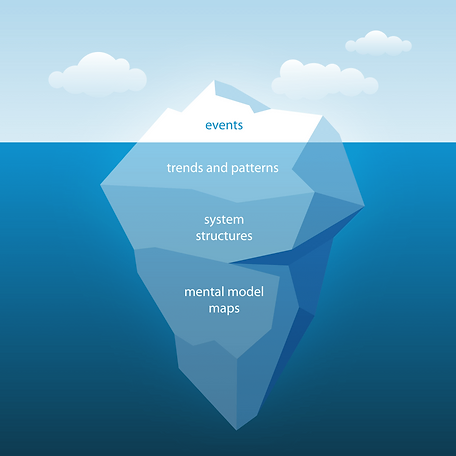In my work as an Executive Team Coach and in my conversations with colleagues, practitioners, professionals, executives…anyone who is part of a team…the issue of team functioning and diagnosis invariably surfaces. Questions such as, why do we re-visit so many of our decisions? Why so some team members not hold themselves as accountable as others? Why does functional or siloed-thinking lead to so many conflicting priorities? Why do we miss so many of our deadlines? Why do we wander off the agenda so often? You get the drift and you may even recognise some of these issues from teams you’ve been a part of.
These issues are clearly things for the team in question to work on, but the theme of this blog is for us as team members and team leaders to see them as symptoms of a potentially deeper underlying condition, in much the same way as for example a doctor might seek to understand what lies beneath a patient’s persistent headache.
Systems thinking
If you did suddenly become aware of regular headaches, you’d consult your GP rather than take a pain-killer to treat what could be a symptom of a more serious underlying condition. Wouldn’t you? Well I hope you would 😊
Your GP would ask you a variety of questions about the nature of the headache and the frequency, do you notice it happening before/after certain situations, etc? And they’d take your blood pressure among other things.
This same principle applies to teams, and here’s where Systems Thinking can help us. Let’s take decision-making, and in particular one team’s regular re-visiting of apparent decisions, leading to frustration and procrastination; and let’s view this as a symptom. In other words, this is evidence of a deeper more serious underlying condition that requires investigation. One of the temptations here for a team leader could be to develop a new decision-making process; in other words, to treat the symptom. Let’s hold that thought and when we’ve applied a Systems Thinking perspective, let’s see if treating the symptom is appropriate?
The iceberg model
Using the iceberg model (Centre for Systems Solutions) we now view the teams’ re-visiting of yet another decision as a Surface Event. Moving ‘below the waterline’ we now ask ourselves what patterns and trends can we observe regarding this issue? Are there conditions or times, or types of decision, when this happens most?
Then, moving deeper below the waterline, we explore what underlying structures could be supporting this issue? For instance, when we’re discussing an issue that requires a decision, do all of us contribute equally, and do all team members’ views hold the same weight? And finally, what mental models does the team hold that support the underlying structure, patterns and events? A potential mental model could be that some team members view is that it’s not safe to challenge certain team members, including the team leader.
And here’s what that underlying mental model reveals….If we don’t have that open honest discussion, we don’t have alignment because we don’t all feel our views have been heard and considered, so we revisit or procrastinate.
You can see now that this deeper underlying condition (the absence of psychological safety) is likely to show up in other aspects of team performance and cohesion. So, is there anything to be gained by treating the surface event/symptom?
My work as an executive team coach is to help the team to surface these underlying mental models, to bring them into all team members’ awareness so that we can work on them; and if our diagnosis is correct, the symptoms go away. But we can only diagnose these issues accurately if everyone speaks openly and honestly to their perspective and, without exception, this….the existence of psychological safety….is a primary function of every high-performing team.
Iceberg Model – Courtesy of Centre for Systems Solutions: https://systemssolutions.org/systems-thinking/



